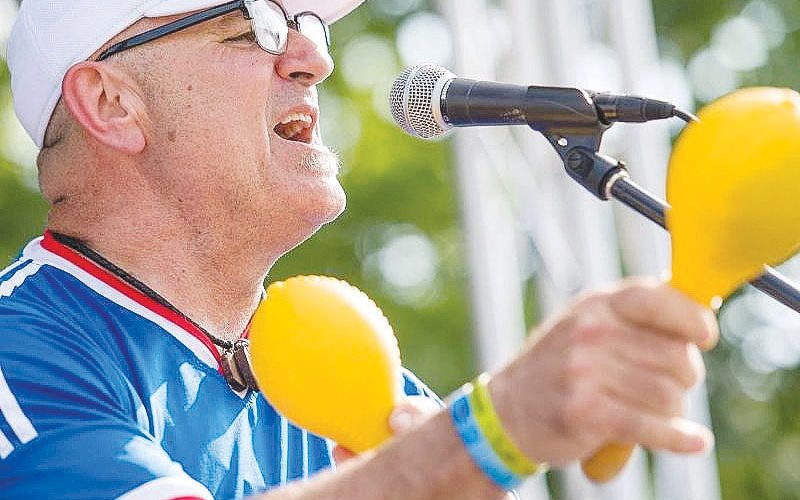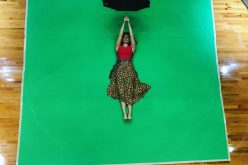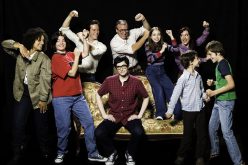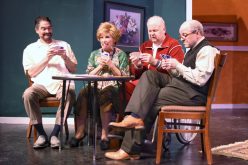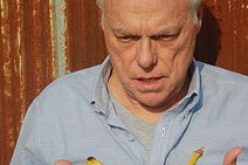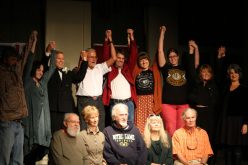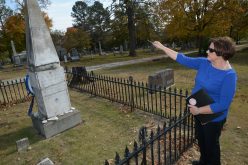We couldn’t have made it through 2020 without the good will and hard work of a number of organizations in Northwest Arkansas who helped to support the community throughout the year. Whether using their own resources to pull someone else up, lending a platform to boost visibility or utilizing their unique talents to put a smile on our faces, their stars shone bright in the middle of the darkness.
Curbside Theatre Takes Performance To The People

Claire Fossey as The Space Traveller investigates the creatures (audience members) in a Curbside Theatre performance at Lynn Meade’s home. ArkansasStaged Executive Director Laura Shatkus says, “It’s like delivery pizza, but good for the heart.”
(Courtesy Photo/Lynn Meade)
Laura Shatkus, executive director of ArkansasStaged — a theater company devoted to bringing experimental theater to unique spaces — quickly recognized two things at the beginning of the pandemic: First, theater was going to suffer in an environment where large gatherings of people were dangerous. Second, and perhaps more importantly, the social distancing required to keep us safe and virus-free would serve to further isolate vulnerable members of our community. So she hatched a plan to bring theater — socially distanced and outdoors — to them. At the beginning of the project, her collaborators included theater artists Kholoud Sawaf, Michael Bell and Mischa Hutchings. Over the course of three months, however, the project expanded, eventually becoming a play called “Hold Fast,” and Adrienne Dawes, Na’Tosha Devon, Claire Fossey and Audrey Romero became involved as well. Ultimately, the 35-minute show would tackle pandemic-appropriate themes like isolation, mental health, empathy and human connection. By the end of the run, the company had delivered curbside performances to Butterfield Trail Village retirement community, the low-income housing community Hillcrest Towers, and families with disabilities assisted by the Arkansas Support Network.
“[We offered a] free show to those people who wouldn’t traditionally get to see theater, especially considering those households that might be extra isolated due to the pandemic — be it people with disabilities, the elderly, people who can’t afford a theater ticket, people who are isolated at home for whatever reason,” says Shatkus.
At a time when theater companies around the world were struggling to figure out how to stay engaged with the community, the group behind “Hold Fast” made some valuable discoveries.
“One big advantage in this kind of production is that it removes a lot of the barriers that some people experience when going to theater in a traditional setting,” says Hutchings. “[Issues with] transportation, child care, cost and an ‘outsider’ feeling are not there. My hope is that audience members will take the idea that theater can happen anywhere and make their outdoor space one of creation.”
“Despite all the fears, there is a sense of safety that comes with the idea of showing up at someone’s doorstep during this time with an art piece,” says Sawaf. “It feels special to say, ‘We are here for you; we came to make you laugh and to lift up your spirit, so you can disengage from the virtual world and engage with us live.’”
Arkansas Arts and Fashion Forum Help NWA Mask Up

Rachel Woody, education program coordinator with Arkansas Arts & Fashion Forum, inspects a mask at their office in Springdale. AAFF recruited volunteer designers and seamstresses to donate their time to make masks for hospitals and medical clinics.
(The Free Weekly/David Gottschalk)
Robin Atkinson was a bit in shock as she announced that the spring shows of the NWA Fashion Week were canceled due to the covid-19 pandemic. The event that would usually consume most of the energy of the organization’s CEO for most of the spring was gone in a puff of smoke.
“We had a couple of decisions to make when we canceled Fashion Week,” she says. “’Do we start moving forward with the program and take stuff online?’ That was something that we were seriously considering.”
While thinking through that option, though, Atkinson says she read an article that radically changed the trajectory of the organization’s future — at least for the duration of the pandemic.
“I texted everyone one morning at 7 a.m. with a link to an article from a newspaper in Oklahoma about a hospital asking for masks,” she says. “Before they had even checked the text, I had posted about it on Facebook.”
After that, the timeline started moving quickly.
“We canceled on March 12 and launched the mask project on March 20,” says Atkinson.
Ultimately, the organization has produced thousands of fabric masks that they donated to hospitals and other medical facilities, helping to solve the problem of the mask shortages in the first months of the pandemic.
“I’m glad we made that pivot, because it has kept us all focused and feeling useful,” says Atkinson.
The House of Songs Provides Tech, Technique

Singer/songwriter Sierra Carson has released four singles this year, with the most recent, “The Calling,” dropping Nov. 13. “It was recorded locally in downtown Fayetteville with LensAudio. It’s an outpouring of thoughts from the perspective of an 18-year-old taking in the issues of social injustice and equality,” Carson shares. “Looking forward, I am in the planning phase for my first EP, which will have a lighter, folk-pop sound. The future will always include music for me, and I’m grateful for Northwest Arkansas and the support I’ve found here that has set me solidly on that path.”
The Austin-born (with an outpost in Bentonville) House of Songs brings musicians from all over the world together to “share the universal language of music in collaborations designed to bridge cultures, build friendships and cultivate peace,” according to its website. With that kind of outreach in its DNA, it’s no wonder that when musicians in Northwest Arkansas started struggling to stay connected to community in the wake of the covid-19 pandemic, the House of Songs was ready to jump in.
Evan Alvarado, the Northwest Arkansas manager for House of Songs, says it was while facilitating the organization’s Player-2-Player program — a songwriting collaboration — that he first started noticing a need. Player-2-Player had moved to online sessions at the beginning of the pandemic, and it quickly became evident that not every musician had the same access to the technology required.
“Be it the gear that they’re using to capture video, the audio, the lighting that they have at home and even their internet, because obviously that’s a big component,” Alvarado says. “Now that that’s how everybody’s kind of viewing things — not getting out very much — we were like, ‘What can we do to help our local artists?’”
With help from a grant from CACHE (Creative Arkansas Community Hub and Exchange), which is part of the Northwest Arkansas Council, the House of Songs was able to help area musicians with a wide range of materials, from something as simple as a ring light to improve their online content to upgraded streaming services to make sure their content was easily accessed and viewed.
For musician and motivational speaker Al “Papa Rap” Lopez, the support was both physical and educational. House of Songs provided him with a green screen and a new microphone adapter — and then went a step further. It set up Zoom calls to help teach him about the technical aspects of delivering online content.

“Baang is my nickname, it’s who I am,” hip-hop artist Jeremiah Pickett explains. “It’s actually an acronym for Believe Aspire Achieve Now Go. It’s a nickname that was given to me when I was younger and initially, there wasn’t a corresponding meaning with it. Well, then I noticed that it started gaining popularity and momentum. And if a name is something that people can gravitate towards and take ownership of, I wanted to make sure that we were doing our due diligence and giving it a purpose and a meaning.”
“That action from the House of Songs was a wake-up call for me, that the show must go on, and ever since, my creative juices have come back, the dark cloud dissipated, and I’ve been writing songs like crazy,” Lopez says. “Thanks to all this, I was able to do my first virtual concert for an elementary school in North Little Rock. The feedback I got from the school was very positive, and it has helped me learn to fix the bugs for the next virtual performance.”
OZCAST Puts NWA Artists Center Stage
When Allyson Esposito took the helm as executive director at the brand new organization called CACHE (Creative Arkansas Community Hub and Exchange), one of her biggest missions was to give Northwest Arkansas talent a center stage on which to strut their stuff.
Then the pandemic hit.
“I think that the question that’s being asked here is, ‘What is the arts council/arts service organization for the new time?’” says Esposito. “’What is the new model for this kind of organization?’ Because we all probably know that the models that have been around for a really long time are no longer going to work. It’s exciting to be developing something new at a moment when we can think alongside really interesting folks, globally.”

“OZCast and Artists 360 are both vehicles that pluck us out of our various practices across the region, and, in bringing us together, they create this very potent and invigorating thing,” author Carolyn Guinzio says. “We really have an incredibly rich and vibrant culture here, and these efforts to make a collective have such a powerful impact.”
(Courtesy Photo)
With this kind of outside-the-box mentality, Esposito, CACHE director of creative ecosystems, Jesse Elliott and 10-time Emmy Award-winning filmmaker and documentarian Mario Troncoso developed something that helps employ artists while, at the same time, giving them exposure: a season of OZCast, an online variety show that will cover NWA artists of all stripes.
Esposito describes it as “a weekly, online, creative variety show, featuring our amazing local grassroots arts community and creativity in every kind of art form, from tattoo artists to cellists. We think it’s an exciting, updated, relevant model for what putting work online in these crazy times looks like.”
Author Carolyn Guinzio is a poet featured in one of the already-debuted episodes of the series.
“That they’ve put this program together with such devotion makes the artists living here feel so respected and valued,” says Guinzio. “The care that has gone into creating each episode is so evident. I also think we must be more isolated from each other than I ever knew, because I’ve learned about people and enterprises that I didn’t know about before.”
Art Feeds Comfort During the Pandemic

Art Feeds founder and CEO Meg Bourne says this is a scary time for kids, and expressing themselves through creativity can help soothe their fears and anxiety. “Sometimes kids are crying about the sock they can’t find,” she reminds us. “But it’s not about the sock.”
(Courtesy Photo)
Meg Bourne, founder of Art Feeds, an organization that uses art instruction to help kids express and process their emotions, knew from an early age how beneficial art could be for a child going through a difficult time. When she was young, Bourne experienced an extreme shyness and social anxiety that was always assuaged when she spent time at her small art table at home. Later, as a volunteer in Joplin Public Schools, she saw, again, how beneficial art can be when used to help students process their emotions.
She’s been running the organization since 2009 with her friend (and now Art Feeds COO) Brooke LeMasters. In 2011, the duo and their gifted team provided critical support to Joplin Public Schools in the aftermath of that city’s devastating EF-5 tornado. That pivotal experience gave them expertise in working with kids exposed to trauma — perfect for a community now experiencing the uncertainty and upset of a pandemic.
They’ve since formed a close partnership with Springdale Public Schools and delivered nearly 7,000 art packs to students who qualify for free or reduced lunch, and trained every Springdale art teacher — as well as their own community assists and organizational partners — in trauma-informed care. But they’ve also reached students outside of SPS through their online offerings — like free weekly projects in English and Spanish, how-to videos and beefed-up trauma curriculum.
“When the pandemic started, I was looking across at Brooke, telling her that the last time I felt this way was after the tornado — that was a community collective trauma,” says Bourne. “But the difference was that then, we could reach outside our community for help. We had people all over the state helping the Joplin community, post-tornado. But in this instance, it’s different, because everyone needs help, and everyone is hurting, and there’s not necessarily a place outside of where you are that you can reach that is on stable ground.
“I think it’s so fortunate that we have been through all of that, that we know how to pivot. We can say, ‘Hey, we’ve been doing this for 10 years — we have the online systems built. Our curriculum is built with an art teacher, child trauma specialists and art therapists. We have everything you need.’ That’s what feels best to me, to be able to take those years of hard work and say, ‘OK, in this moment, we can give you a piece of stable ground to stand on.’”

